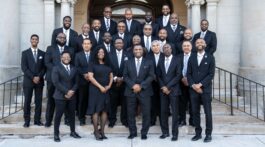You can’t reason a man out of something he wasn’t reasoned into.
~G. K. Chesterton
We would like to think that we are reasonable people. Few are. The women’s ordination issue demonstrates this difficulty. If it were a matter of pure reason, reason would prevail. But both sides in the WO debate feature elaborate rationales, and neither persuades the other. l’m not saying both positions are equally valid, from a strictly logical point of view. I am saying most of us do not make our decisions based on logic.
The Greek philosopher Plato described three primary modes of persuasion: Ethos, Pathos, Logos. To vastly oversimplify, Ethos is an appeal to authority. It is the answer to the question, “Why should you listen to me?” In our internal church debates this often takes the form of either “science says,” “theologians say,” “Sister White says,” or “the Bible says.” It is often employed not as an effort at persuasion but of coercion, to end discussion. These days we hear this in “The vote has been taken; to continue to disagree is rebellion!” The authority, of course, is the GC vote. Appeals to authority have limited value; limited by the receiver’s acceptance of that authority. If the receiver believes the vote is “the voice of God,” it might be effective.
Pathos is an emotional appeal. This is, frankly, the most effective appeal if we understand how to make it correctly. In fact, I would argue that it is the way most of our decisions are made.
Logos is the appeal to logic. Much of the argument on women’s ordination was framed in logical terms. Using Bible verses and examples (Ethos, authority), evidence was assembled and linked (Logos, logic), and brought to conclusions. There were logical arguments on both sides. But remember the quote from Chesterton, above. Attempts to reason the “other side” out of their position would only succeed if reason was the foundation of their belief.
However, the initial reaction we all have to an idea is not logical. It is almost always emotional. That’s why the three modes of persuasion are best employed in the order I listed them: Ethos, Pathos, Logos. But the Ethos is not the heavy-handed “God says,” which is too often simply “I believe this, and therefore I believe God says it.” The primary role of Ethos at the start is simply getting the opportunity to speak.
The prophet Nathan gives us a perfect example of this.
The King had already violated the most sacred of trusts. Not only had he taken the wife of a brave soldier away at war, he had then conspired to have that soldier placed in such peril as to be certainly slaughtered. Few things cause more damage to a cause. Men fight for their wives and their homes. To think that the one who ordered them into battle would betray them so deeply would lead to mutiny, rebellion, and defeat.
But David was not unaware of the logic of the situation. He was, as King, the chief judge in Israel. It was because he understood the law and its implications that he had gone to the trouble to cover up. Telling him he had done wrong would not likely result in anything but the imprisonment or even death of the one who dared to tell him.
Under these difficult circumstances Nathan came to David. His Ethos, his reason that David should listen, was twofold. First, David recognized Nathan as a prophet and longtime counselor. Second, Nathan couched his appeal in the form of a legal case that needed to be adjudicated.
He tells the tale–it is fiction, by the way–of the man with the ewe lamb, who is exploited by his wealthy neighbor with many sheep. When a visitor comes to the wealthy man, he slaughters his neighbor’s pet ewe lamb instead of one of his own. David is, predictably, outraged–an emotional reaction, this being attested to by his extreme sentence: “That man shall surely die!”
The remedy for theft in the Pentateuch was four-fold restitution; the proper penalty would be for the rich man to repay four ewe lambs to the poorer man he had robbed. But David had not been acting rationally since he first glimpsed Bathsheba on the rooftop.
At this point, Nathan reveals his true purpose: “You are the man!” he said to David. And, confronted with the emotional truth of the enormity of his crime, David’s heart broke. It was then that the logical consequences hit him. Note how skillfully Nathan chose his story. Before Samuel anointed him King, David had spent his days as a shepherd. The story of the pet lamb appealed to his shepherd’s heart, as Nathan hoped. Ethos got Nathan into David’s presence; Pathos broke the stubborn, sin-hardened heart; Logos sealed the verdict.
When lobbying for the homeschool families in Iowa, we arranged to have homeschooled children prepare and serve breakfast at the Statehouse. Many legislators who legitimately feared that children schooled at home would lose out, or even be abused, were won over by the courteous, intelligent, wholesome young people who served them breakfast. The lawmakers met and spoke with homeschool families. There was still difficult work to do, but we had overcome the emotional unease many lawmakers had felt regarding our cause. Our Ethos was: we are your constituents, people you represent. Our Pathos was: Look at who we are, what we are like; we are safe for you to support. That left only the Logos: logical reasons to vote in our favor.
Of course there was more to the whole process of winning over some even hostile legislators. We had to apply Ethos, Pathos, Logos over and over with lawmakers and the governor individually. But we went from 80-20 opposed to 45-3 in the Senate and 84-16 in favor in the House. It worked for Nathan, and it works today.
And let us realize that winning fellow Seventh-day Adventists over on this issue is realistically much easier than winning over unbelievers to our faith. It will be good training, good experience if we hope to win the world to Christ.
The details of how this will be worked out will differ in each case. But we can do this. Surely God wants His people united in moving forward. And, as I will suggest in later blogs, women’s ordination is a symptom of a deeper disease, which we must, for the sake of ourselves and our posterity address without delay.










